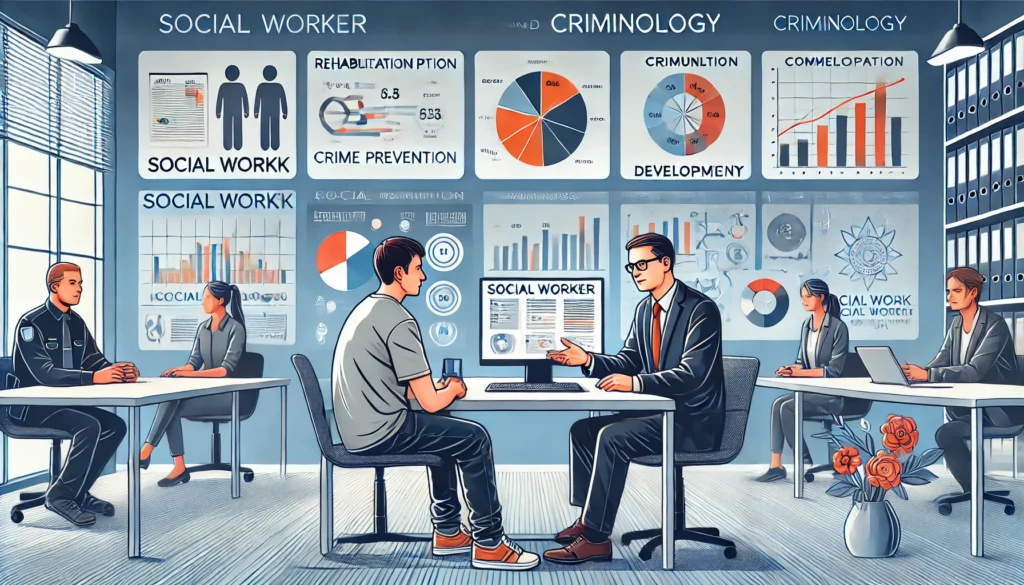Introduction
Criminology, as a multidisciplinary field, examines the causes, consequences, and prevention of criminal behavior. Within this framework, social workers play a pivotal role in addressing the social dimensions of crime. Acting as mediators between individuals, communities, and the justice system, social workers in criminology work to prevent criminal behavior, support rehabilitation efforts, and advocate for systemic changes that promote social equity. This article explores the multifaceted role of social workers in criminology, emphasizing their impact on both individuals and society.
The Role of Social Workers in Criminology
Preventing Criminal Behavior
Social workers are instrumental in addressing the root causes of criminal behavior, such as poverty, lack of education, and exposure to violence. By providing resources, counseling, and support, they work to reduce the factors that increase the likelihood of offending. For instance, early intervention programs targeting at-risk youth help mitigate the circumstances that often lead to criminal activity.
Rehabilitation and Reintegration
One of the core responsibilities of social workers in criminology is aiding in the rehabilitation and reintegration of offenders. They collaborate with correctional facilities, probation officers, and community organizations to:
- Develop Individualized Treatment Plans: Social workers assess the needs of offenders, creating tailored programs that address mental health, substance abuse, and other contributing factors.
- Facilitate Skill Development: By offering vocational training and educational opportunities, they help offenders build skills necessary for a successful reintegration into society.
- Support Family Reunification: Social workers mediate between offenders and their families, fostering stronger relationships that reduce recidivism.
Advocacy and Policy Development
Social workers advocate for systemic changes within the criminal justice system. They work to promote policies that focus on rehabilitation rather than punishment, emphasizing restorative justice practices. By highlighting the social determinants of crime, social workers contribute to legislation aimed at reducing inequality and improving community welfare.
Key Areas of Social Work in Criminology
Juvenile Justice
Social workers in juvenile justice focus on preventing delinquency and providing young offenders with opportunities for reform. They work closely with schools, families, and community programs to address the underlying issues driving juvenile crime. Programs such as mentorship, therapy, and recreational activities are crucial in steering youth away from criminal pathways.
Victim Support
Victims of crime often require emotional and psychological support to navigate the aftermath of their experiences. Social workers provide crisis counseling, assist with navigating the legal system, and connect victims to necessary resources. Their role is vital in ensuring that victims regain a sense of stability and security.
Mental Health and Substance Abuse
Many offenders struggle with mental health issues or substance abuse disorders. Social workers collaborate with healthcare providers to ensure these individuals receive appropriate treatment. Integrated care models that combine therapy, medication, and support groups are often implemented to address these challenges.
Community Development
Social workers engage with communities to create safer environments by addressing systemic issues such as unemployment, inadequate housing, and limited access to education. Community-based programs, such as neighborhood watch initiatives and after-school activities, help foster a sense of collective responsibility and reduce crime rates.
Theoretical Foundations
The role of social workers in criminology is underpinned by several theories:
- Social Disorganization Theory: This theory highlights how community instability and lack of social cohesion contribute to crime. Social workers apply this framework to strengthen community bonds and improve social infrastructure.
- Strain Theory: Recognizing that societal pressures can lead individuals to commit crimes, social workers provide alternative pathways to achieve success.
- Restorative Justice: Social workers facilitate restorative practices that focus on repairing harm and rebuilding trust between offenders, victims, and the community.

Challenges Faced by Social Workers in Criminology
Despite their critical role, social workers encounter numerous challenges:
- Resource Constraints: Limited funding and resources often hinder the implementation of effective programs.
- Systemic Barriers: Bureaucratic obstacles and resistance to change within the justice system can impede their efforts.
- Emotional Burnout: Working with offenders, victims, and marginalized populations can take a toll on social workers’ mental health.
The Impact of Technology
Advancements in technology have transformed the field of social work in criminology. Tools such as data analytics and case management software allow social workers to track progress, identify trends, and deliver services more efficiently. Online counseling platforms and mobile apps also enhance accessibility for clients in remote or underserved areas.
Case Studies
Success in Juvenile Rehabilitation
Programs like the Missouri Model in the United States emphasize a rehabilitative approach for juvenile offenders. Social workers play a central role in creating therapeutic environments that focus on personal growth and accountability, resulting in significantly lower recidivism rates.
Restorative Justice in Action
In New Zealand, the Restorative Justice Program incorporates social workers to mediate between offenders and victims. These sessions focus on dialogue and mutual understanding, leading to positive outcomes for all parties involved.
Conclusion
Social workers in criminology serve as essential agents of change, addressing the social underpinnings of crime and promoting justice through compassion and advocacy. Their work not only benefits individuals but also contributes to safer, more equitable communities. By integrating social work principles into criminology, societies can move toward a more restorative and rehabilitative approach to justice.

